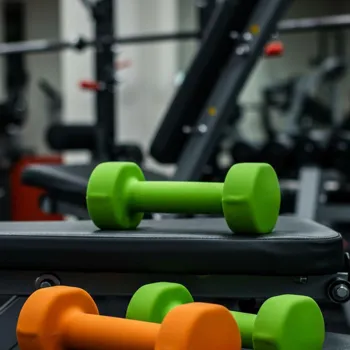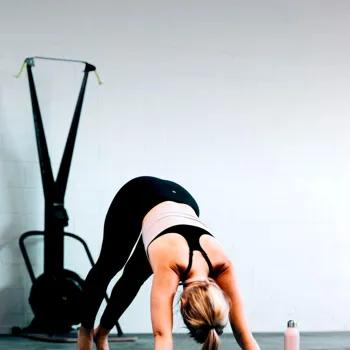Unravel the 10 Common Fitness Mistakes to Avoid! Dive in to discover how to navigate your fitness journey successfully!
So, you've decided to embark on a fitness journey? That's fantastic! Getting fit and
healthy is one of the best decisions you can make. But, like any journey, the road to fitness is often paved with good intentions and, unfortunately, a few common pitfalls.

Many of us start with great enthusiasm, only to find ourselves plateauing, getting injured, or simply giving up. Why does this happen? Often, it's because we're making mistakes that sabotage our progress. Don't worry, you're not alone!
We've compiled a list of 10 common mistakes people make in their fitness journeys, so you can avoid them and stay on track to achieve your goals. Understanding these errors is the first step towards a successful and sustainable fitness lifestyle.
Let's dive in and learn how to make your fitness journey smoother and more rewarding. Remember, it's a marathon, not a sprint, so be patient, persistent, and learn from your mistakes.
Jumping into intense workouts is a recipe for disaster. Start slowly and listen to your body
We've all been there. Inspired by a Bollywood celebrity workout video or a friend's amazing transformation, you decide to jump headfirst into an intense exercise routine. You start running miles every day, lifting heavy weights you're not ready for, and pushing yourself to the absolute limit.
While this enthusiasm is admirable, it's a recipe for disaster. Overtraining is a very common mistake. Think about it: your body needs time to adapt to new stresses and demands. Suddenly subjecting it to high-intensity workouts can lead to injuries like sprains, strains, and even stress fractures.
Moreover, burning yourself out quickly is likely. You might feel exhausted, lose motivation, and ultimately give up altogether. Instead, start slowly and gradually increase the intensity and duration of your workouts. Listen to your body and rest when you need to.
Remember, consistency is key, and a slow, steady approach is far more effective than a short burst of intense activity. Your body will thank you for it!
Exercise complements nutrition for optimal health
You will see a lot about it so let us be clear; You can't outrun a bad diet". Exercise is important, but it’s only one piece of the puzzle. If you're eating unhealthy foods, processed snacks, and sugary drinks, you won't see the results you're hoping for, no matter how hard you work out.

Nutrition fuels your body and is crucial for energy, recovery, and muscle growth. This doesn't mean you have to deprive yourself or follow a complicated diet plan. Focus on eating wholesome, unprocessed foods like fruits, vegetables, whole grains, and lean protein.
Make sure you're getting enough fiber and healthy fats. Pay attention to portion sizes and avoid overeating. Healthy eating doesn't have to be boring. Experiment with new recipes and find nutritious foods that you enjoy.
Skipping warm-up and cool-down is a big workout mistake
Many people are so eager to get their workout that they skip the warm-up. Others are so tired after exercise that they don't do cool-down. This is another big mistake. Warm-ups prepare your body for exercise by increasing blood flow to your muscles and improving flexibility.

It reduces the risk of injury. A good warm-up could include dynamic stretching, such as arm circles, leg swings, and torso twists. Cool-downs help your body gradually return to its resting state after exercise. They can prevent muscle soreness and stiffness.
A cool-down could include static stretching, where you hold a stretch for 20-30 seconds. Taking the time to warm up and cool down is essential for preventing injuries and improving your overall fitness performance.
Prioritize quality sleep for fitness and recovery
Sleep is often overlooked as a key factor in fitness. But it's during sleep that your body repairs and rebuilds muscle tissue. Insufficient sleep can lead to fatigue, decreased performance, and increased risk of injury. Aim for 7-8 hours of quality sleep each night.

Create a relaxing bedtime routine like what you did as a child, such as reading a book, taking a warm bath, or listening to calming music. Make sure your bedroom is dark, quiet, and cool. Avoid caffeine and alcohol before bed.
When you prioritize sleep, you'll have more energy for your workouts and recover faster afterward. So, recharge to recharge!
Drinking water optimizes exercise and health
Water is essential for all bodily functions, including exercise. Drinking enough water can help improve performance, prevent muscle cramps, and regulate body temperature. Most people don't drink enough water throughout the day, especially when they're active.

Carry a water bottle with you and sip on it throughout the day. Drink water before, during, and after your workouts. Avoid sugary drinks, which can dehydrate you. Pay attention to your body's signals. If you're thirsty, you're already dehydrated.
Drinking enough water is one of the simplest, yet most important, things you can do for your health and fitness.
Avoid comparing progress with others; focus on personal fitness journey
In the age of social media, it's easy to fall into the trap of comparing yourself to others. You see seemingly perfect bodies and wonder why you're not achieving the same results. Keep in mind that everyone's fitness journey is different.
Don't get discouraged if you're not seeing progress as quickly as someone else. Focus on your own goals and celebrate your own achievements. Remember, comparison is the thief of joy. Instead of comparing yourself to others, start tracking your own progress.
This can be as simple as writing down your workouts, measuring your weight and body fat percentage, or taking progress photos. Tracking your progress can help you stay motivated and see how far you've come. It also allows you to make adjustments to your routine as needed.













